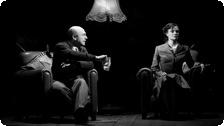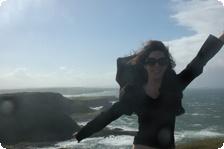by Evan Karp
“There must be a part of you, deep down, that still longs to splash about in the dangerous sea.” Those are hairy words for a married man to speak to a married woman in 1938, the year in which Noël Coward’s Brief Encounter is set. The play is being staged at The American Conservatory Theater as the first installment of its 100th year, and ACT could not have made a better choice.
I got there before doors opened and had a chance to look around. Unfortunately, ACT strictly prohibits picture-taking, so I’ll have to convey the shockingly luminescent fuchsia curtain unfurling fifteen feet from the golden-domed ceiling with words! The first impression is shock—all you can see is the curtain, neon, radiant, spectacular. But that shock gradually shifts into an array of details all demanding attention. For the first ten minutes I was gawking as though I’d been transported in time.
The curtain is surrounded by thick gold panels that meet at the top and curl upward to the ceiling, forming a dome punctuated by a topaz-blue oval containing ten concentric circles of small bright lights exploding outward in every direction with gold rays like the sun—the whole opal surrounded in gold and contained within a smooth salmon enclosure the same color as the gold-bordered panels on the walls. Tasteful opulence! There are two balcony levels, each studded with miniature fluorescent dome bulbs along the underside of the crescent and each providing a breathtaking view—the lighting is perfect, dazzling, almost intoxicating. After taking in the sights from each level I sank into my very own plush velvet seat and began to read the program.
For each play, ACT provides a booklet entitled Words on Plays, which includes insight into the play, playwright, and production. It’s basically a program on steroids. Not only did I have a firm grasp on Brief Encounter before it began, making it easy to follow and understand, but I was also able to learn about the evening’s context.
Kneehigh Theatre is famous for performing outdoors. The company was born in Cornwall, which did not have a theater at the time, so they performed wherever possible: in woodlands and on beaches, on cliff tops, even in parking lots.
Although the troupe now has access to a performance space in Cornwall they write and fine-tune all productions in a couple of rustic barns there. For weeks they drop everything and “descend on” these barns to make a show. They become the show: people play music into the night, have ideas and implement them—it becomes a microcosm straight out of some ancient fairy-tale. As director and adapter of Brief Encounter Emma Rice says, “Two weeks at the barn is like two months in the rehearsal room, and the work is so deep and so much fun that you don’t notice it’s happening.”
There is a special intimacy about Kneehigh that I would not have understood without Words on Play. Before the lights even dimmed the group’s musicians appeared on the topmost VIP balcony with a banjo and a cello and began playing lighthearted music from the 1930’s. As the theater began to fill, the musicians moved down to the floor and the chatter was loud enough that I did not notice them stop playing … it’s possible they didn’t. But they crossed over to our side of the stage and it was then I could tell they were dressed in authentic 1930’s costumes. At this moment the rest of the cast came out and began interacting with the crowd: snapping their fingers, swaying, asking how people’s days were. When they moved toward the stage the crowd hushed, and after instructing the audience to turn off all their “beepy thingies” in an old English accent, the lights were dimmed, the curtain drawn, and a giant screen—almost the entire size of the stage—showed a black and white still life of a living room.
A crew member stands at each side of the screen with a flashlight as though ushers, and the play’s leads (Laura and Alec) rise from seats within the audience and begin speaking. The ushers shush them as though they are interrupting the film.
So begins a very intriguing interplay between theater, film and music. Laura’s husband Fred appears on the screen entirely motionless and stares straight into the audience. He does this until it’s almost uncomfortable, calling for Laura twice, who is still in the audience having an intensely emotional conversation with Alec. They confess a mutual love for one another but Laura pleads that they stay sensible, and she makes a getaway … through the screen! But not just through it—into it! The actress parts the screen and suddenly her character is standing in the living room with Fred, in black and white, as though she has just walked through the door.
This was the first of many magical moments. The screen is used in the background of each set to provide varying atmospheres. In the height of our characters’ brief encounter we see them dancing merrily and drinking champagne while the screen is filled with floating bubbles. The rest of the cast sings and shiny blue confetti is tossed in the air while Laura spins, elevated and swinging from a chandelier. But when she comes down Laura bemoans that she is a stranger in her own house. A shooting star bursts across the canvas and gradually the bubbles slow and we realize that the bubbles are actually stars. I thought of Nietzsche’s quote: every star needs atmosphere to shine, how the cast was providing this with music—the musicians not static either, but having fun and being expressive—how the lights were used, the delicate balance between live sound and image—all the components that signify a love affair: timing is perfect, every little sensation significant. I myself was having a love affair with the cast, the theater, even the audience.
The fusion of ACT’s grandeur and the congenial warmth of Kneehigh’s actors is enough to remind you how human the world can be. All of us are on stage sometimes, but that shouldn’t change how we act. Each character was personable, charming in their very own ways. I almost cringe to call it acting—so pure it was and heartfelt. I had the impression that each actor was a spotlight shining into the audience so we could take stock of ourselves and glow in turn.
One of my favorite moments occurred during intermission. Again the actors came out to mingle with the crowd. They even went around with silver platters and offered bite-sized cucumber sandwiches (one of the principal settings is a tea shop). The usher who helped me to my seat, dressed with the impeccable majesty you would expect from a world-class venue, took a cucumber-bite and enjoyed it publicly with the enthusiasm of a young girl clutching one of grandma’s famous brownies. The people all around me smiled and considered getting up to go get one, childish in their glee.
As Rice says of the process of creating these shows, four weeks can seem much longer and much more full than they are. Laura and Alec both agree that although they’ve only known each other for a month they feel as though time has moved slowly and seems to have lasted much longer than that. I felt the same way during this play. I forgot about time and about other things that don’t matter. I was no longer simply part of a still room, but in motion, fluid, and swept away. It was a night of true transformation, and one that did not require I involve myself in a devastating love affair. All I had to do was go down to the American Conservatory Theater and buy myself a ticket. I heartily, heartily recommend you do the same.
The show is being staged through October 11th, when Kneehigh hits the road to continue its full US tour. More information can be found here, and tickets can be purchased here, by phone at 415.749.2228, or at the box office on 405 Geary Street.
Don’t just take my word for it! Read some reviews:
“Every so often a theater piece comes to town that is so brilliantly conceived and executed, so entertaining on every level, that you want everyone you love or even like just a bit to see it. Brief Encounter . . . is that kind of experience.”
“Positively magical!”
“An imaginative feast”
“Wonderfully refreshing! Great fun, switching seamlessly between theater and film while retaining the damp-eyed nostalgia of the period that leaves you with a warm and sentimental glow”
All black and white photos by Steve Tanner
Read more of my writing here.







